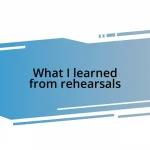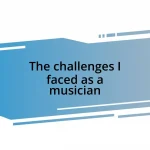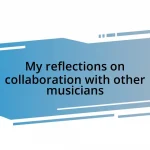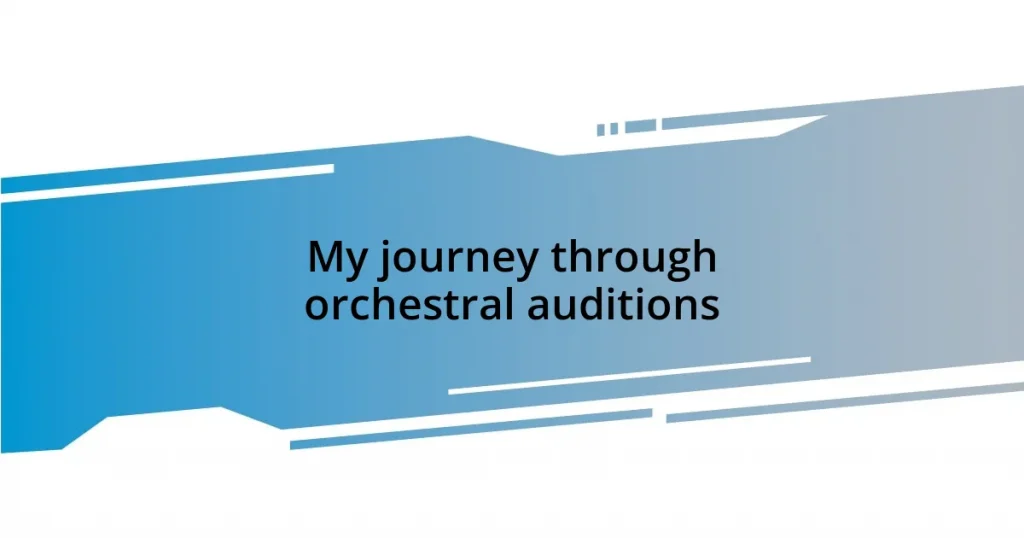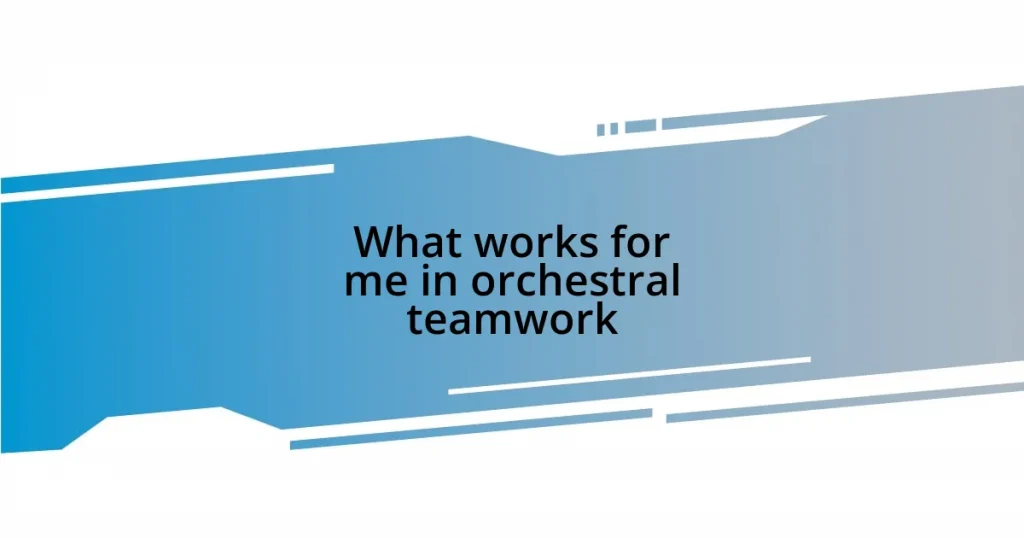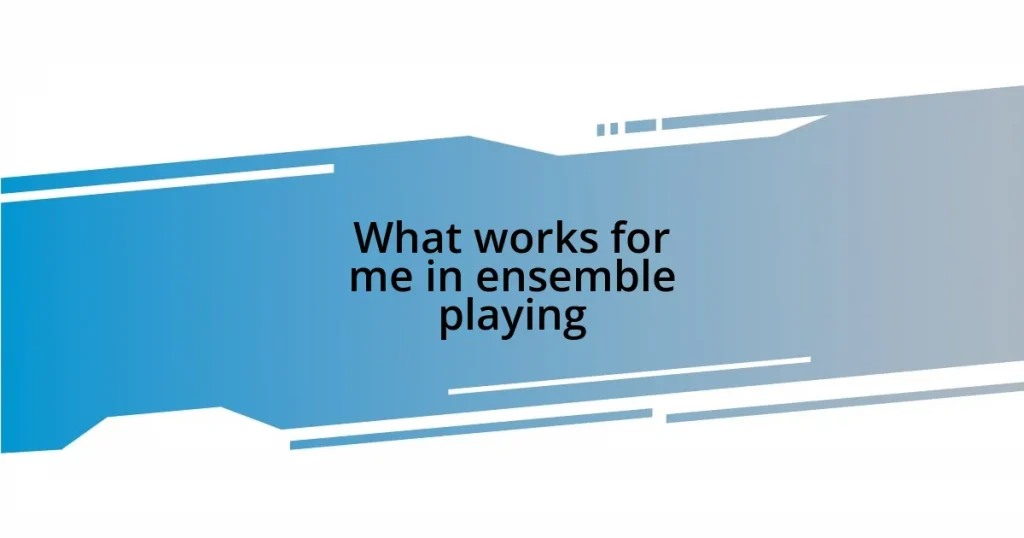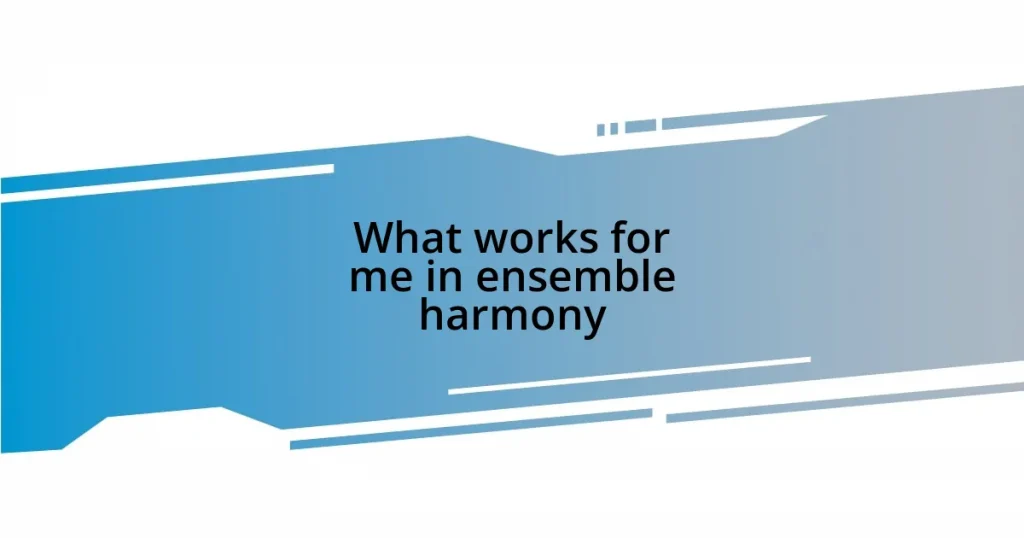Key takeaways:
- Orchestral auditions require a unique blend of technical skill and emotional expression, making it essential to convey a story through music.
- Mental preparation, including visualization techniques and creating a pre-audition routine, can significantly enhance performance confidence.
- Receiving feedback after auditions should be embraced as an opportunity for growth; engaging with constructive criticism leads to improvement.
- Building resilience as a musician involves maintaining a growth mindset and seeking support from peers during challenging times.
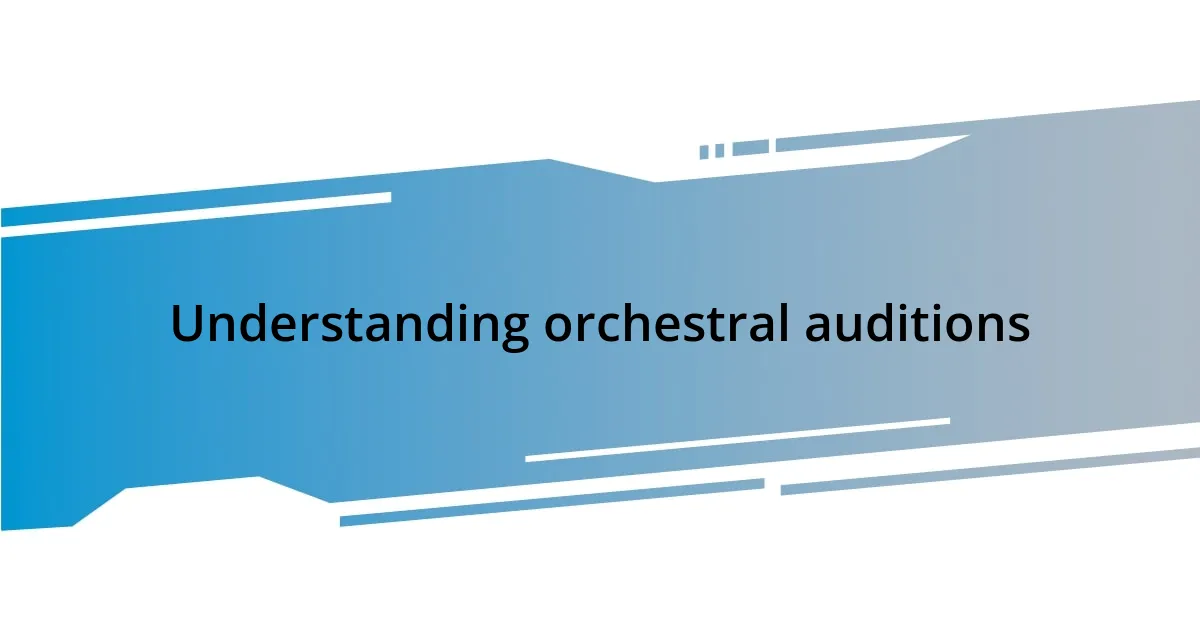
Understanding orchestral auditions
Orchestral auditions can feel like a daunting maze, both exciting and nerve-wracking. I remember my first audition vividly; I stood backstage, heart racing, as the sound of the orchestra tuning filled the air. It was in that moment of anticipation that I truly understood the weight of the opportunity before me.
Each audition is more than just a chance to play; it’s a reflection of countless hours of practice and dedication. I often ask myself: what does it take to stand out in a sea of incredibly talented musicians? During one particularly challenging audition, I learned that it’s not just about technical perfection—it’s about conveying emotion and telling a story through music.
Additionally, the audition process often includes various stages, from the initial screening to the final round. I once faced a panel of judges who seemed imposing, but I realized they were simply searching for that unique spark in a performer. Have you ever considered what they might be hearing beyond the notes? I’ve come to believe that a truly captivating performance can transform the experience for both the musician and the listener, making every audition a step toward artistic growth.
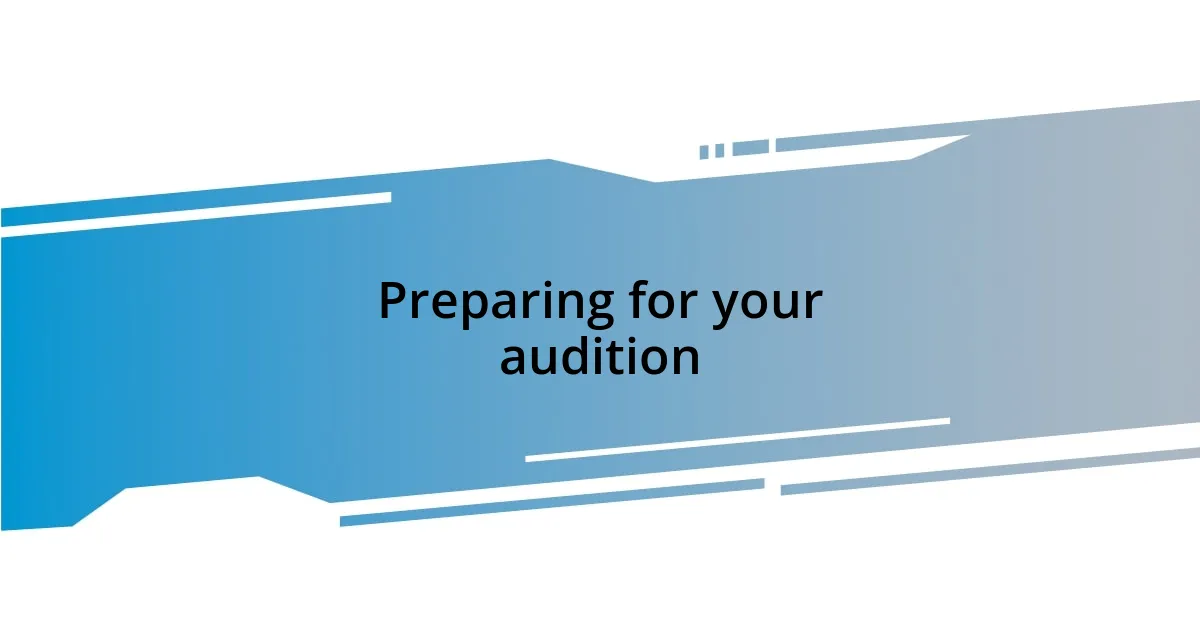
Preparing for your audition
Preparing for an audition begins with a solid practice routine. I’ve found that setting clear goals for each practice session helps me stay focused. For instance, I would dedicate specific days to mastering difficult passages, allowing myself to build confidence over time. When I’m rehearsing, I often imagine the audition setting, which turns my practice into a simulated performance. This technique not only calms my nerves but arms me with the mental preparation necessary for success.
Mental preparation is just as important as physical practice. I remember a time when I faced overwhelming anxiety before an audition. To combat this, I started to incorporate visualization techniques into my routine. I would close my eyes and picture myself performing on stage, fully absorbed in the music, and it truly changed my mindset going into the audition. Have you ever tried visualizing success? I believe it can make a remarkable difference and help you feel more grounded.
Lastly, knowing the repertoire inside and out is crucial. I always make it a point to listen to recordings of the pieces I’ll be playing. This not only allows me to absorb the nuances but also helps me gain insight into different interpretations. By approaching the pieces with an open mind, I find my unique voice within the score. I always ask myself: how can I make this music my own? After all, the audition is as much about showcasing individuality as it is about technical skill.
| Preparation Element | Personal Insight |
|---|---|
| Practice Routine | Set clear goals and incorporate simulated performances to build confidence. |
| Mental Preparation | Use visualization techniques to combat anxiety and envision success. |
| Repertoire Knowledge | Listen to recordings and seek personal interpretations to showcase individuality. |
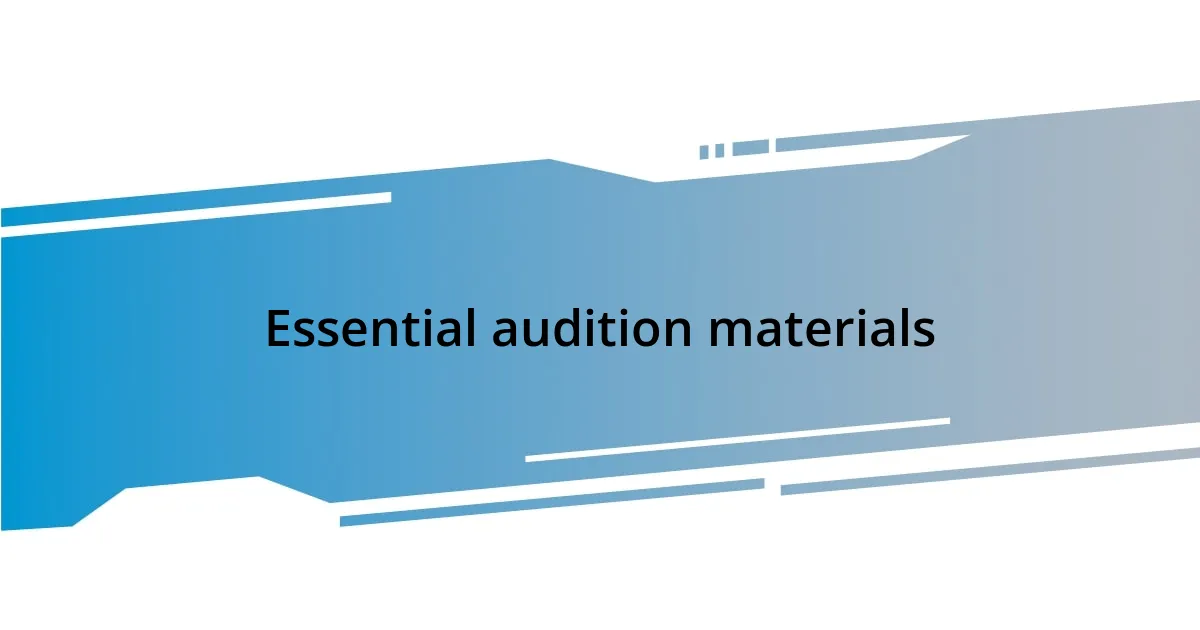
Essential audition materials
When it comes to auditioning, having the right materials can significantly impact your performance. I’ve learned this the hard way, showing up unprepared once with incomplete parts, and feeling the rush of panic wash over me. To avoid that sinking feeling, here’s a list of essential audition materials that every musician should pack:
- Sheet Music: Bring printed copies of the required pieces, ideally marked with your fingerings and bowings.
- Resumé: Include your musical experience, education, and any notable performances, making sure it looks professional and is easy to read.
- Headshot: A recent, high-quality photo can help create a strong first impression—something I almost forgot during one of my auditions.
- Audition Fee: Don’t forget to check if there’s a fee and bring the exact amount, as I’ve learned the hard way that unexpected last-minute expenses can derail your focus.
- Water and Snacks: Keeping hydrated and energized may seem trivial, but I’ve found that a quick snack can help stave off nerves and keep your mind clear.
Having each of these materials ready ensures that you can focus on what really matters—the performance itself. I remember one particular audition where being organized made all the difference; I felt a wave of calm wash over me as I confidently reached for my neatly organized folder. Preparation helps you embrace the moment, allowing your talent to shine through.
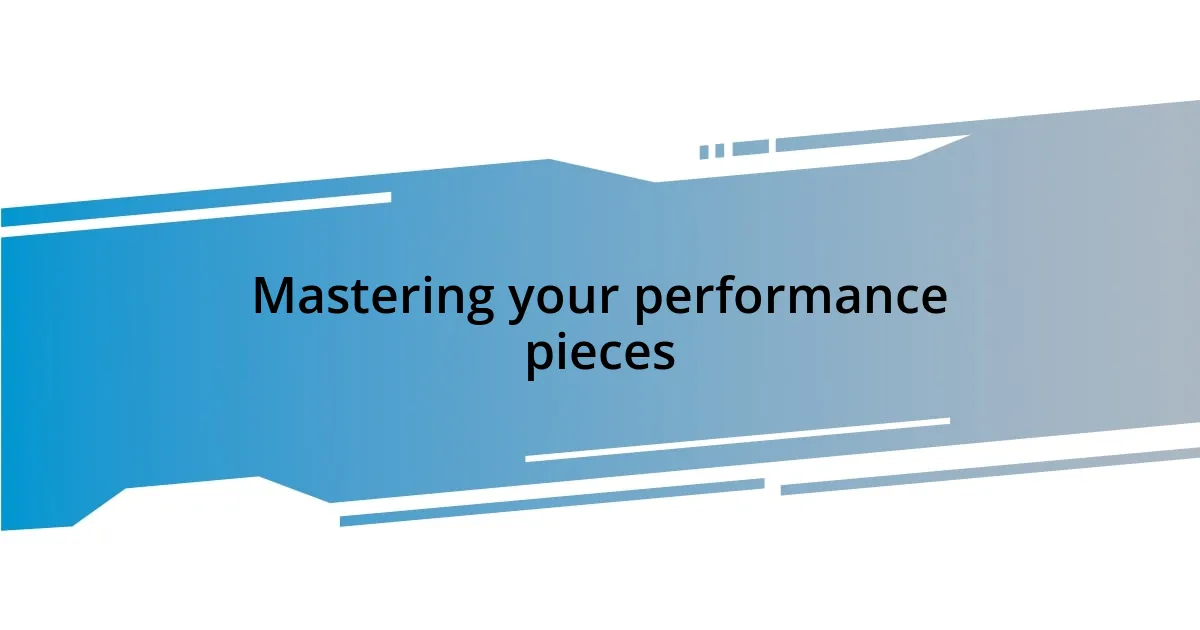
Mastering your performance pieces
Mastering your performance pieces requires a blend of technical skill and emotional connection. I recall a moment in my journey when I was struggling with a particularly challenging concerto. It wasn’t just the notes that were tough; it was the emotional depth the piece demanded. By diving into the story behind the music, I found a way to infuse my performance with genuine feeling. Have you ever gotten lost in the narrative of a piece? That connection can be what elevates your interpretation from good to unforgettable.
I’ve also learned that consistent practice is paramount, but it’s not just about hitting the right notes. I’ve made it a habit to record my sessions and listen back critically. Hearing my own playing from an outside perspective has often highlighted areas for improvement that I wouldn’t notice in the moment. I remember being surprised at how a simple dynamic shift transformed a lackluster section into something striking. How often do you take the time to reflect on your performances? That process of self-evaluation can be a game-changer.
Ultimately, balancing precision with passion is key. I’ve found that when I allow myself to express vulnerability through my performance, my artistry shines brighter. Once, during a particularly tense audition, I intentionally let my emotions show, almost unable to hold back tears during a poignant passage. The judges could see and feel the music as I did. Have you ever experienced a moment in your playing where you felt completely connected? That kind of authenticity not only resonates with the audience but can also set you apart as a musician.
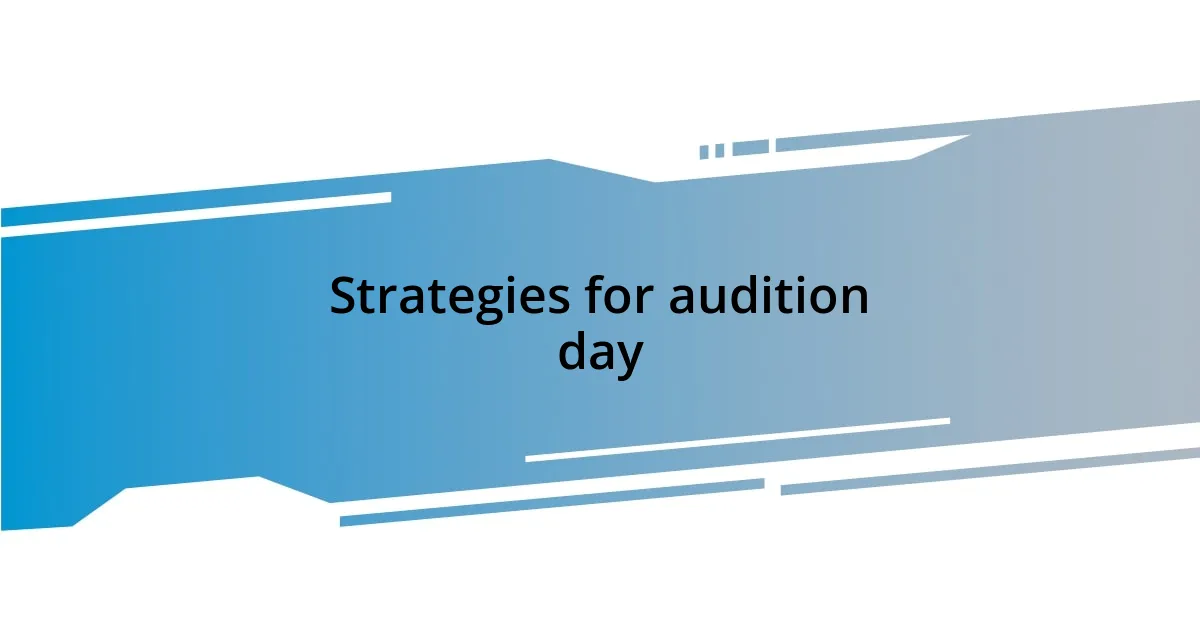
Strategies for audition day
On the day of the audition, one strategy that works wonders is visualization. Before I step into the audition room, I take a moment to mentally picture myself performing my pieces flawlessly. I focus on how it feels to be in control, letting the music flow through me effortlessly. Have you ever closed your eyes and envisioned a successful outcome? This kind of mental rehearsal can help calm those pre-audition butterflies and bolster your confidence.
Another tactic I swear by is creating a pre-audition routine. For me, this involves listening to my favorite uplifting music and doing light stretches to release any tension. I’ve found that incorporating such rituals not only centers my mind but also helps get my body ready for the physical demands of playing. What do you do to get in the zone before a big performance? Finding that balance of relaxation and excitement can be the secret ingredient to a stellar audition.
Finally, I can’t emphasize enough the importance of staying flexible during your audition. I recall one instance when the judges asked me to play a section I hadn’t anticipated. It threw me off for a moment, but instead of panicking, I took a deep breath and treated it as a mini-performance. How do you handle unexpected changes during auditions? Embracing the unplanned can showcase your adaptability, and let’s face it—the judges appreciate musicians who can roll with the punches!
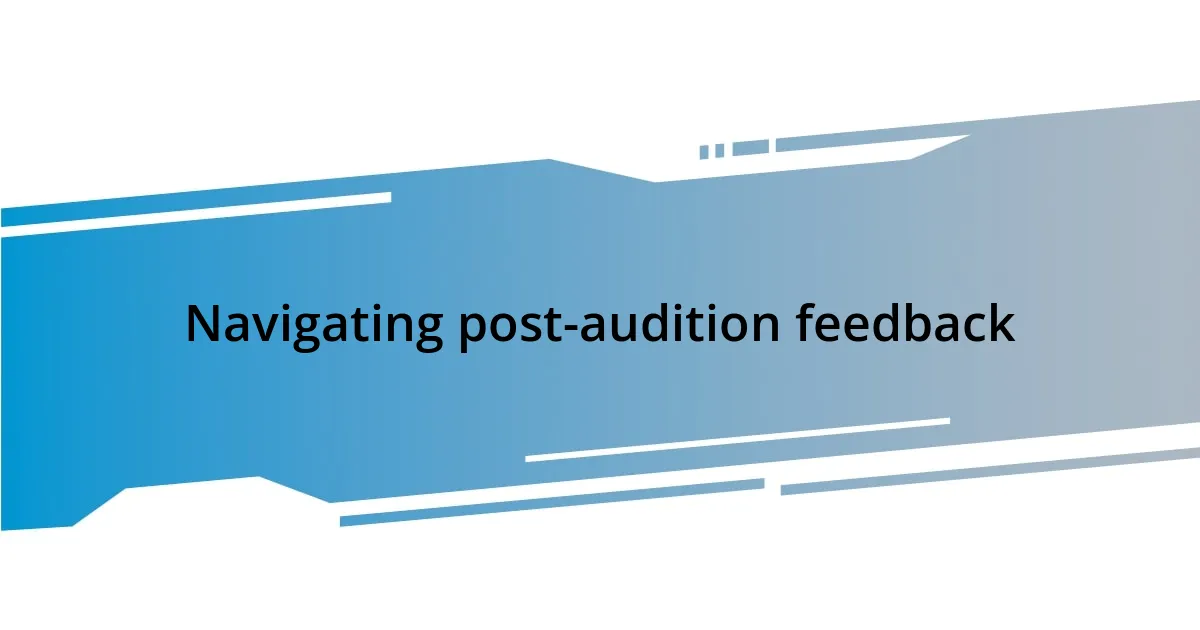
Navigating post-audition feedback
Receiving feedback after an audition can be a mixed bag of emotions. I remember one time, I received comments that were both encouraging and critical. It was tough to hear, but I tried to remind myself that this was an opportunity for growth. Have you ever felt a sting from feedback, only to realize later that it was a valuable lesson? Embracing this duality in feedback is crucial for progressing as a musician.
It’s also important to sift through the feedback thoughtfully. During one audition, a judge pointed out a specific section where my rhythm faltered, which I initially felt defensive about. However, after reflecting on it, I went back to the score and practiced that passage obsessively. I found that focusing on the constructive bits could lead me to improvement. How often do we take the time to truly understand what feedback is telling us? Engaging with feedback directly can transform our weaknesses into strengths.
Finally, I’ve learned to approach feedback as a conversation rather than a verdict. After one audition, I reached out to a judge for clarification on his comments. He was surprisingly open to discussing my performance, and his insights were invaluable. Have you considered reaching out for deeper understanding? Sometimes, these conversations can forge connections and provide perspectives that could radically change your approach moving forward.
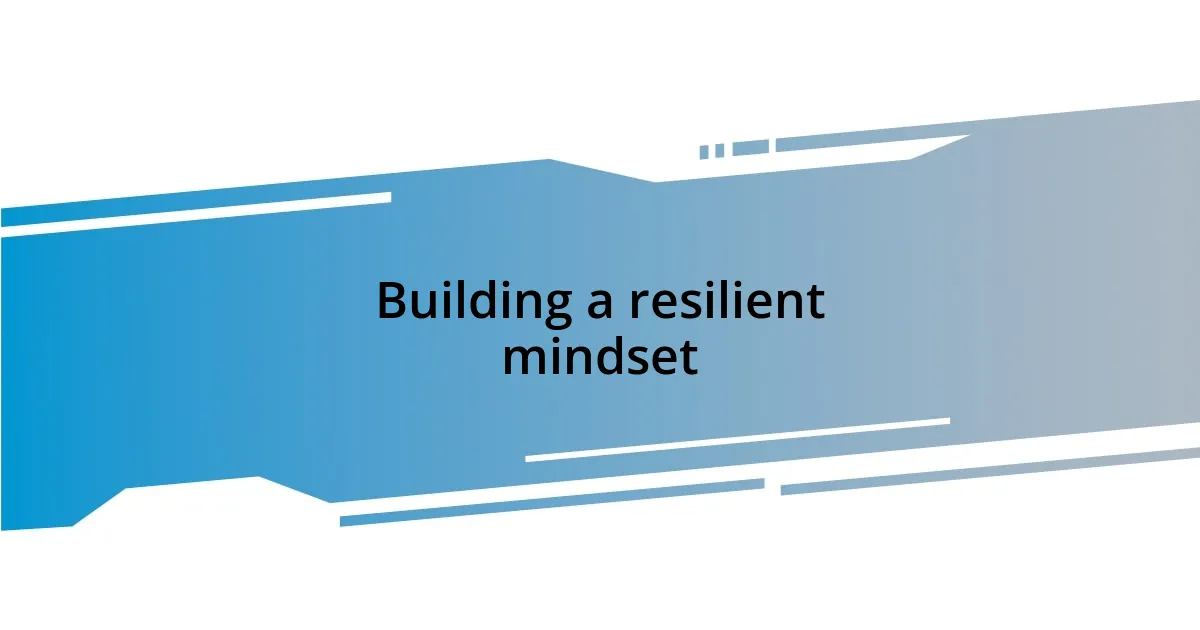
Building a resilient mindset
Building a resilient mindset in the face of orchestral auditions isn’t just a buzzword; it’s a way of life for musicians like me. Early on in my journey, I learned the hard way that resilience means accepting that sometimes, no matter how much I practice, auditions can still go sideways. I vividly remember a moment when I stumbled over a passage that I had played perfectly countless times. In that instant, I felt like a wave of panic was about to drown me, but I reminded myself that one mistake doesn’t define my entire journey. How do you bounce back when faced with unexpected challenges?
Reflecting on that experience, I realized that cultivating a growth mindset is crucial. Instead of viewing setbacks as failures, I started seeing them as stepping stones toward improvement. I recall a time after a disheartening audition when I sat down with my instrument and just played for joy, not for judgment. That simple act reignited my passion and renewed my confidence. When was the last time you played just for the love of it? This approach reset my perspective and empowered me to approach the next audition with a fresh mindset.
Moreover, seeking support from fellow musicians has been instrumental in building my resilience. During particularly tough times, I have turned to my peers for encouragement and advice, sharing our collective experiences. I remember a late-night conversation with a friend where we exchanged our biggest audition flops and laughed about them. Have you ever shared your audition woes? It’s amazing how camaraderie can lighten the burden and remind us that we are all in this together, striving for the same dream. That sense of shared experience not only bolstered my resolve but also made the journey all the more enjoyable.





